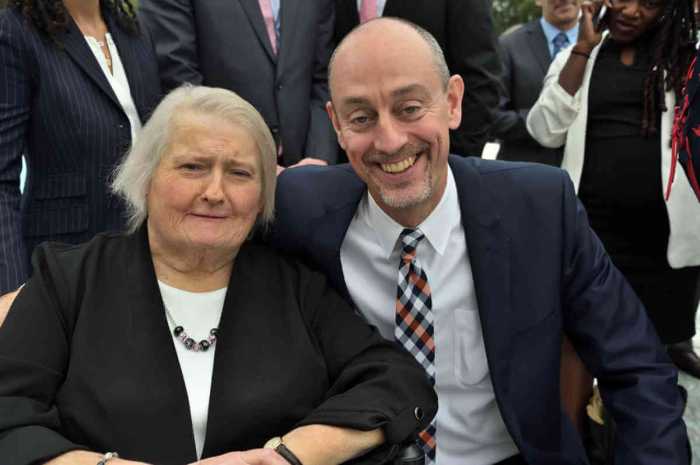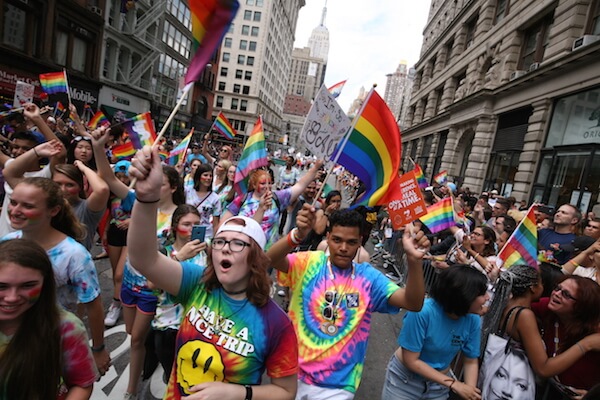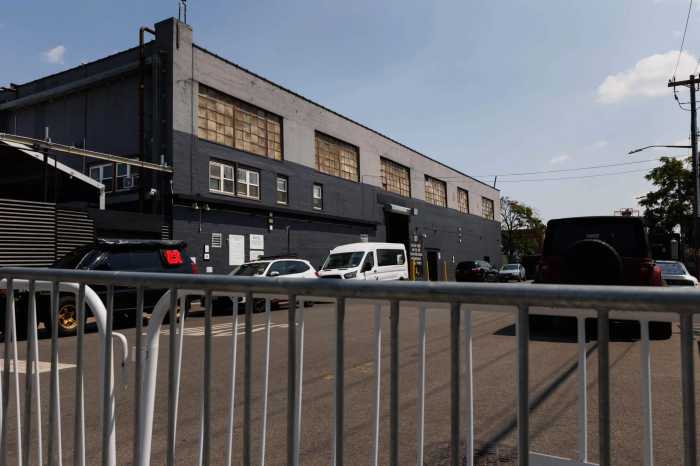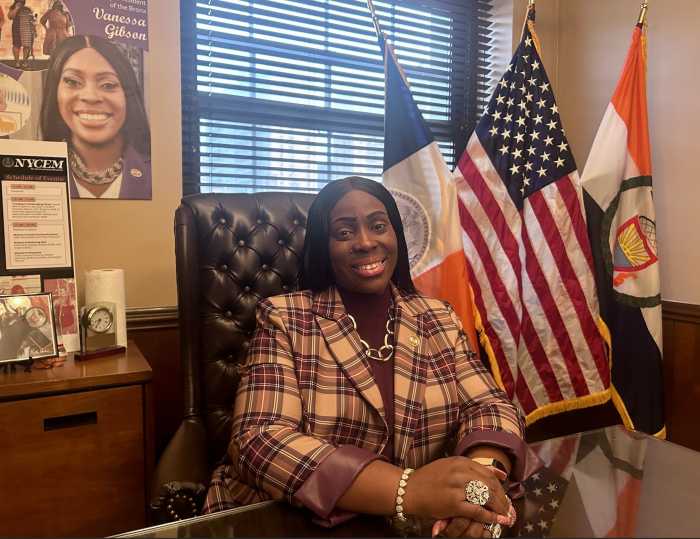Ash Whitaker (right), with his mother, Melissa, has settled his suit with the Kenosha, Wisconsin, school district, so the question of trans students' rights to access restroom facilities consistent with their gender identity will not go before the Supreme Court in its current term. | TRANSGENDER LAW CENTER
As the Supreme Court’s 2017-18 term began in October, it looked like a banner term for LGBTQ-related cases. Petitions were pending asking the court to address issues ranging from whether LGBTQ people are protected against discrimination under federal sex discrimination laws covering employment (from Georgia) and educational opportunity (from Wisconsin) to whether queer people in Mississippi had standing to seek a federal order preventing a religiously-motivated and viciously anti-gay law from going into effect and whether the Texas Supreme Court erred in holding that the 2015 federal marriage equality ruling did not necessarily require a municipal employer to treat same-sex married couples the same as different-sex married couples in its employee benefits plan.
The high court had already granted review in a gay wedding cake case from Colorado, which was argued on December 5, and another petition involving a Washington State florist who refused to provide arrangements for a same-sex wedding was waiting in the wings.
But the hopes for a blockbuster term have rapidly faded. In December, the court declined to hear the Texas employee benefits case and the Georgia employment discrimination case involving the sex discrimination provisions of the 1964 Civil Rights Act’s Title VII.
High court won’t revisit standing issue in challenge to anti-gay Mississippi law; Wisconsin school and trans student settle
And now in January, the court has declined to hear the Mississippi case, and the Wisconsin case — on the question of whether transgender students are protected by sex discrimination provisions of Title IX of the Education Amendments of 1972 — has settled, with the school district agreeing to withdraw its Supreme Court petition.
It may be that the only LGBTQ-related issue that the court decides this term is the one it heard argued in December: whether a business owner’s religious objections to same-sex marriage or his right to freedom of speech would privilege him to refuse to make a wedding cake for a same-sex couple. An opinion is expected by the end of June.
The Supreme Court will not review the standing issue that, to date, has barred two plaintiff groups, one represented by Roberta Kaplan and the other by Lambda Legal, from challenging Mississippi's new harshly anti-LGBTQ law. | KAPLAN & COMPANY
The Mississippi Anti-Gay Law Case On January 8, the Supreme Court refused to review a ruling by the New Orleans-based Fifth Circuit Court of Appeals, which had dismissed a constitutional challenge to Mississippi’s infamous H.B. 1523, a law enacted in 2016 that protects people who discriminate against LGBTQ people because of their religious or moral convictions. The Fifth Circuit ruled that none of the plaintiffs — either organizations or individuals — in two cases challenging the Mississippi law had “standing” to bring the lawsuits in federal court.
H.B. 1523, originally scheduled to go into effect on July 1, 2016, identifies three “religious beliefs or moral convictions,” protecting anybody who acts in accord with those beliefs in a wide range of circumstances against “discrimination” by the state. The beliefs laid out in the statute are that “marriage is or should be recognized as the union of one man and one woman”; “sexual relations are properly reserved to such a marriage”; and “male (man) or female (woman) refers to an individual’s immutable biological sex as objectively determined by anatomy and genetics at time of birth.”
Among other things, the law would protect government officials who rely on these beliefs to deny services to individuals and would preempt the handful of local municipal laws in Mississippi that ban discrimination because of sexual orientation or gender identity so that victims of discrimination would have no local law remedy. Mississippi does not have a state law banning sexual orientation or gender identity discrimination, so H.B. 1523, as it relates to private individuals and organizations, was mainly symbolic except in the cities of Jackson, Hattiesburg, and Oxford and on the campus of the University of Southern Mississippi.
Two groups of plaintiffs brought constitutional challenges against the law in the Southern District of Mississippi federal court, where the case went before Judge Carlton W. Reeves, the same judge who ruled for plaintiffs in a case challenging Mississippi’s ban on same-sex marriage a few years earlier. He issued a preliminary injunction against implementation of H.B. 1523 on June 30, 2016, the day before it was to go into effect, finding that it would violate the First Amendment by establishing particular religious beliefs as part of the state’s law. The plaintiffs also challenged it on equal protection grounds. Reeves refused to stay his preliminary injunction, and so did the Fifth Circuit.
But when the state appealed the preliminary injunction itself, a unanimous three-judge panel of the Fifth Circuit, ruling on June 22, 2017, found that the district court did not have jurisdiction to issue the injunction because, according to Circuit Judge Jerry Smith’s opinion, none of the plaintiffs could show that they had suffered or were imminently likely to suffer the “concrete and particularized injury in fact” necessary to confer the “standing” required to challenge the law in federal court.
The standing rule developed by the Supreme Court long ago aims to avoid tying courts up in hypothetical cases and issuing advisory opinions. Federal courts, the high court held, have authority to resolve only “real” cases.
The Mississippi plaintiffs asked the full Fifth Circuit bench to reconsider the three-judge panel’s ruling, but the circuit judges voted 12-2 not to do so, announcing that result this past September 29.
The dissenters, in an opinion by Judge James L. Dennis, bluntly stated that “the panel decision is wrong” and “misconstrues and misapplies the Establishment Clause precedent.” Indeed, wrote Dennis, “its analysis creates a conflict between our circuit and our sister circuits on the issue of Establishment Clause standing.”
Dennis pressed home the point by citing numerous cases from other circuits which, he held, would support allowing the plaintiffs to seek a preliminary injunction blocking the law from going into effect. This gave the plaintiffs hope they might be able to get the Supreme Court to take the case and reverse the Fifth Circuit, since one of the main criteria for the Supreme Court granting review is to resolve a split in authority between the circuit courts on important points of federal law.
The court’s denial of the petitions from the two plaintiff groups was made without any explanation or open dissent, leaving important questions about how and when people can mount a federal court challenge to a law of this sort unresolved.
H.B. 1523, meanwhile, went into effect on October 10.
A challenge to H.B. 1523 continues before Judge Reeves in the district court, as new allegations by the plaintiffs require reconsideration of their standing and put into question — especially in light of the Supreme Court’s June 2017 ruling in Pavan v. Smith, an Arkansas case involving the right of same-sex parents to have both their names on their child’s birth certificate — whether the Mississippi law imposes unconstitutional burdens on LGBTQ people seeking to exercise their fundamental constitutional rights.
The Wisconsin Transgender Student Case Two days after the court announced it would not review the Fifth Circuit ruling, the parties in a case involving the legal rights of transgender students under Title IX of the Education Amendments of 1972, a federal sex discrimination law, and the Equal Protection Clause of the 14th Amendment, announced a settlement of their lawsuit. Under the agreement, the school district will withdraw a petition asking the Supreme Court to reverse a ruling in favor of transgender high school student Ash Whitaker by the Chicago-based Seventh Circuit Court of Appeals. Whitaker graduated from Wisconsin’s Tremper High School in the Kenosha School District last June.
Whitaker transitioned while in high school and asked to be allowed to use the boys’ restroom facilities, but district officials told him there was an unwritten policy restricting bathroom use based on biological sex. He sued the district under Title IX, the federal law forbidding sex discrimination by schools that receive federal money. US District Judge Pamela Pepper in the Eastern District of Wisconsin issued a preliminary injunction on Whitaker’s behalf in September of 2016 and refused to stay it pending appeal.
On May 30, 2017, the Seventh Circuit upheld Pepper’s ruling, finding that even though the Trump administration had withdrawn a guidance issued under President Barack Obama interpreting Title IX sex discrimination provisions to protect transgender students, both Title IX and the 14th Amendment require the school to recognize Whitaker as a boy and allow him to use boys’ restroom facilities.
This past August 25, the school district petitioned the Supreme Court to review the Seventh Circuit’s decision, even though Whitaker had graduated in June.
In the meantime, Pepper ordered the parties into mediation to attempt a settlement, with Whitaker’s June graduation undoubtedly contributing to the pressure to settle, and the parties asked the Supreme Court several times to extend the deadline for the young man to respond to the district’s petition while negotiations continued.
According to press reports on January 10, the case settled for $800,000 and an agreement that the district would withdraw its petition.
The settlement and the petition’s withdrawal leaves the Seventh Circuit’s opinion standing as the first appeals court ruling to conclude on the merits that Title IX and the 14th Amendment require public schools to respect the gender identity of their students and to allow students to use sex-designated facilities consistent with their gender identity.
Lacking a Supreme Court ruling on the point, however, the decision is only binding in the three states of the Seventh Circuit — Wisconsin, Illinois, and Indiana, the same three states bound by another Seventh Circuit ruling last year holding that employment discrimination because of sexual orientation violates Title VII of the 1964 Civil Rights Act.





































